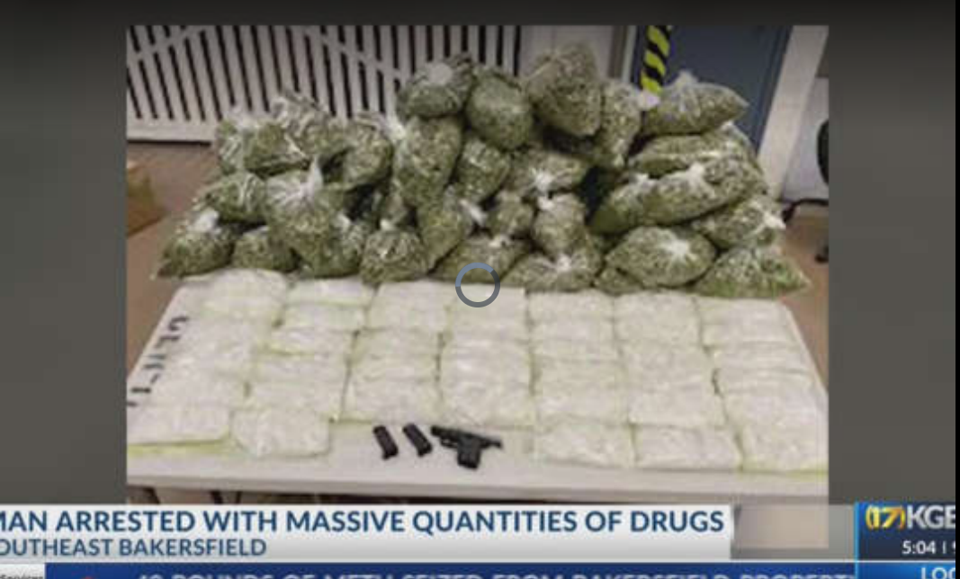
The authorities have stated that Mark Andrew Wright's unlawful actions were deemed "sophisticated", as they entailed the utilization of fictitious identities, fraudulent addresses, deceptive courier redelivery requests, and the operation of numerous phones equipped with encrypted communication applications.
According to court documents, Wright, aged 54, possesses a substantial criminal record.
During the period spanning from June to September 2017, he imported three packages from California. These packages were addressed to fictitious individuals and were found to contain methamphetamine concealed within documents.
All three packages, which were intercepted by Customs, contained 111.7 grams, 146.4 grams, and 138.3 grams of the drug.
The aggregate weight of 396.4 grams was appraised to have a street value of $268,800.
In 2019, a jury determined Wright's guilt on three counts of importing methamphetamine. Subsequently, in the following year, he was sentenced to a term of nine years and six months in prison.
Subsequently, law enforcement authorities pursued his assets in accordance with the Criminal Proceeds (Recovery) Act 2009, a legislative measure designed to seize the unlawfully acquired assets of criminals.
The perpetrators focused their attention on the 114-year-old two-bedroom residence located in Sydenham, Christchurch.
The police have submitted an application to the High Court seeking the forfeiture of the property on the grounds that it is deemed "tainted", as it was allegedly funded in part by proceeds from the importation and distribution of methamphetamine.
The police assessment appraised the property at $300,000, but the 2022 ratable valuation of the house was $450,000.
Wright held a mortgage on the property for a mere $25,000.
Despite not being convicted of supplying methamphetamine, Wright has historical convictions for cultivating cannabis, importing ephedrine, possessing meth, and importing the restricted drug gamma-butyrolactone (GBL) from Thailand, as stated by High Court Justice Rachel Dunningham.
The police informed the High Court that the comprehensive body of evidence indicated that Wright was engaged in the commercial distribution and importation of methamphetamine.
"In my opinion, based on the comprehensive evidence, it appears that in 2017, Mr. Wright had developed a consistent practice of acquiring methamphetamine from the dark web using bitcoin and subsequently selling it, often through encrypted communications," stated Justice Dunningham.
Although he does not have any previous criminal convictions for importing methamphetamine, he does have two convictions for importing other drugs, indicating that he does have experience in such activities.
In November 2017, law enforcement officials conducted a search of the residence in Sydenham, where they discovered two glass methamphetamine pipes, nine cellular phones, and multiple SIM cards.
The contact number provided for one of the packages from California had been associated with a phone that had been redirected to a Kiwibank Post Shop for collection.
One of the telephone numbers was utilized to contact the courier service FedEx regarding the packages.
Additionally, a document was discovered at Wright's residence that detailed instructions on utilizing the dark web to procure drugs through the use of Bitcoin.
Customs investigators discovered that Wright had utilized encrypted applications on his mobile devices, including sending messages inviting a contact to utilize the secure messaging application Wickr.
Justice Dunningham stated that upon analysis of the phones, it was discovered that there were text messages indicating Mr. Wright's involvement in drug dealing, as well as other messages showing his purchase of bitcoin.
During the trial, the prosecution argued that Mr. Wright utilized bitcoin as a method to procure methamphetamine for distribution.
Justice Dunningham stated that the mortgage for the Sydenham house was funded from a bank account into which a "significant amount" of suspicious cash had been deposited.
Wright attempted to clarify the questionable cash transactions by attributing them to withdrawals from a Xapo cryptocurrency trading account, proceeds from vehicle sales on TradeMe, and earnings from boarders.
However, his transaction history with Xapo did not reveal any transactions resulting in cash withdrawals.
Justice Dunningham stated that there was a lack of evidence indicating that the cash originated from vehicle trading or sales on TradeMe.
The sole individual who paid for board in his residence was his girlfriend.
According to police testimony in court, Wright's reported income in the years leading up to his convictions was consistently described as modest, with a peak of $47,935 in 2014-15 and less than $23,000 in 2016-17.
However, during the period spanning from March to October 2017, Wright accumulated a total of $51,400 in cash deposits into his bank accounts.
According to Justice Dunningham, Wright was not employed and receiving benefits from 2017 onwards, yet he was still able to fulfill his mortgage obligations and build equity in the property.
She directed that the ownership of the property be transferred to the Crown.




